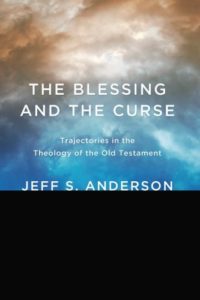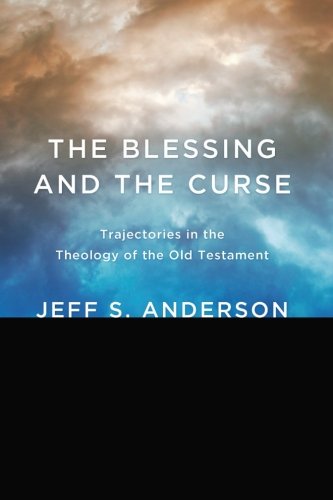 The Blessing and the Curse: Trajectories in the Theology of the Old Testament, by Jeff S. Anderson (Wipf & Stock, 2014), 416 pages.
The Blessing and the Curse: Trajectories in the Theology of the Old Testament, by Jeff S. Anderson (Wipf & Stock, 2014), 416 pages.
Reviewed by David Barry
Anderson’s purpose is to analyze the dual biblical theological theme of blessing and cursing across the OT. Whereas previous scholarship has been interested in the supposed magic of the words, Anderson chooses instead to apply speech-act theory to the various instances of blessing and cursing (261).
Anderson neatly sums up this study saying, “In addition to traditional insights from historical-critical research, new understandings from speech-act theory allow the interpreter a fresh methodology to reflect on ways that God enhances or opposes a life of fullness without viewing blessing and curses as some primitive, magical notion that has no place in a twenty-first-century reflection about God” (326). The reader who takes this sentence as a guide will find few surprises within.
Summary
He begins in Chapter 1, introducing OT theology with the suggestion that it should be viewed as the fusion of normative and descriptive study. In other words, there should be a balance between the two. In Chapter 2, Anderson defines his terms with reference to previous descriptions of blessing and cursing (e.g. Mowinckel, Westermann). Specifically, Anderson sees blessing and curses as speech acts functioning within a society that recognizes them as such. They are illocutions intended to lead to a life of fullness or emptiness. That is, they have a function within society contingent upon its recognition of it.
At this point, Anderson launches into his normative and descriptive analysis of the dual theme across the OT. Chapter 3 analyzes the whole Pentateuch both from a source critical perspective and from a literary approach. Chapters 3-7 take smaller sections of the Pentateuch in turn: Genesis 1-11, the ancestral narratives, Exodus, and Deuteronomy (with reference to the Deuteronomistic history).
Chapters 6 and 7 in particular highlight the correlation between a life of obedience to Yahweh and covenant blessing. Anderson then proceeds to highlight the conditionality of blessing in the Deuteronomistic history. For example, ‘land’ is a blessing contingent upon covenant faithfulness. Thus, idolatry can lead to its loss and consequent exile. The curse of exile is the opposite of the land blessing.
In Chapter 8, Anderson discusses the united monarchy: Saul, David, and Solomon. Each experienced an initial phase of blessing and a subsequent curse. Each sinned and brought about curse, after a Deuteronomistic fashion. One helpful insight is Anderson’s comparison of the Deuteronomistic history’s surprisingly balanced emphasis upon the Davidic blessing as well as upon the curse. Anderson explains, “the Deuteronomist appears to be as interested in cursing David’s dynasty as in blessing it” (202).
Chapters 9-12 survey significant texts in the prophets, cultic texts (e.g. Psalms), Job and other wisdom literature, and apocalyptic writings. Anderson concludes noting that OT theology results in the union of curse and exile, but these give way to restoration and renewal (320). Finally, he concludes noting the benefits of applying speech-act theory to blessing and cursing as a better modern explanation for the phenomena than previous magical suggestions.
Evaluation
Like most books, Anderson’s The Blessing and the Curse has a number of elements worthy of commending and some that are not. Perhaps most helpful of all is his careful discussion of the nature of cursing and blessing. His rejection of the magical power of the word, but emphasis upon the perlocutionary effect of curse or blessing in society is illuminating. His discussion of the arur formula as a communal shunning illustrates this (31-37). Moreover, Anderson’s observation that superiors curse inferiors, and typically in a corporate or ritual setting, is intriguing evidence to the point (32-33).
Some may take issue with Anderson’s treatment of the text. On more than one occasion, Anderson insinuates that the biblical writer is writing historical fiction rather then real history (e.g. Samuel’s overly negative portrayal of Saul [cf. 192]) or that a certain part of scripture is inferior to another (e.g. imprecatory psalms “do not measure up” to the ethics of the rest of the Bible [264]).
As a general comment on the whole, although there is much to commend Anderson’s work, there is too much of it. A good editor could reduce the book without losing much content. Related to this, Anderson’s word-choice is sometimes careless. For instance, in his discussion of the golden calf episode of Exodus he calls the executions “murder” (143). Perhaps he is tipping his hand or perhaps Anderson ought to be less reckless with his word choice. This slip of the finger implies wrongdoing in divine judgment. For another example, he calls Moses the “ultimate” mediator (147).
The substance of the book is Anderson’s application of speech-act theory as a methodology (cf. 40-50). At times this is very helpful. For example, a curse of shunning someone from the camp is effective as a performative act recognized by the community doing the shunning. At other times, however, speech-act theory merely provides more jargon and labels without explaining anything further. For example, Anderson’s attempt to explain the irreversibility of Isaac’s misplaced blessing upon Jacob is explained away in terms of illocution (115-16). It was (irreversibly) done by the speaking. Frankly, this explains nothing, but merely throws some labels at it.
Overall, the weakness of Anderson’s The Blessing and the Curse is his failure to provide consistent explanation or even connection between the various instances of blessing or cursing studied. He retells the significant portions of OT history regarding these things, but fails to explain the significance of the pattern.
David Barry is a PhD student in Hermeneutics and Biblical Interpretation at Westminster Theological Seminary.
Preview or buy The Blessing and the Curse here on Amazon.


